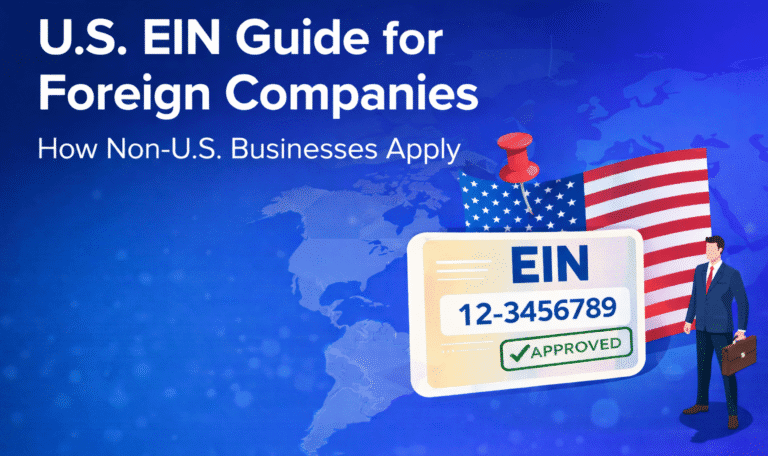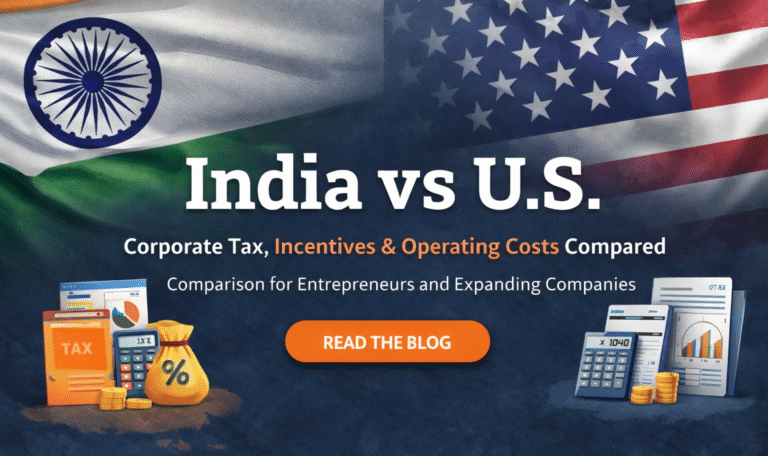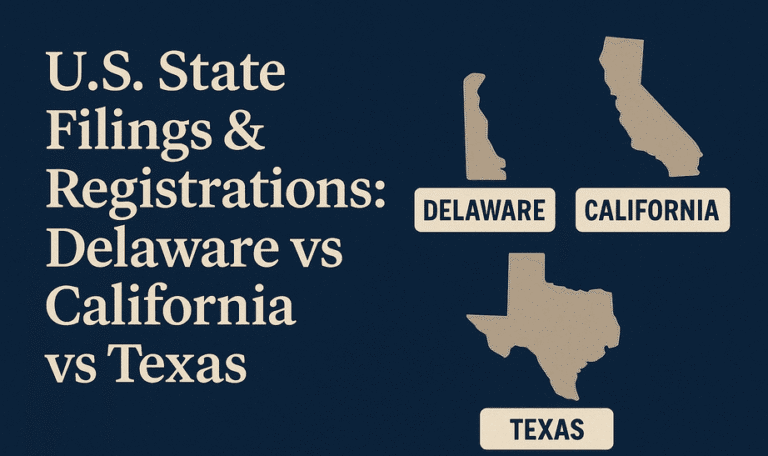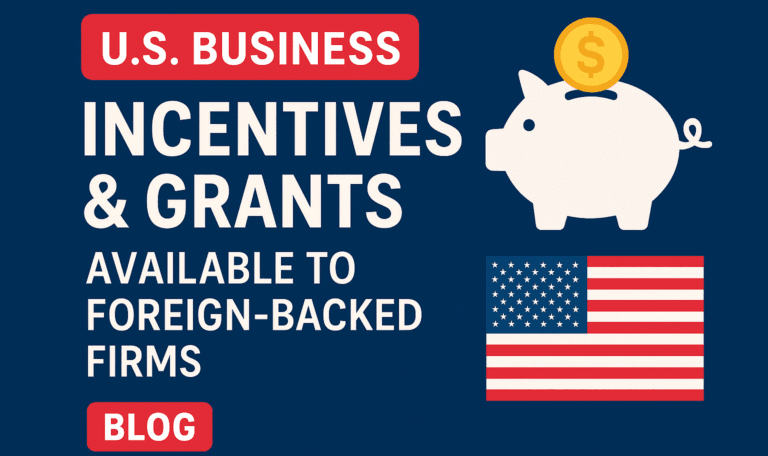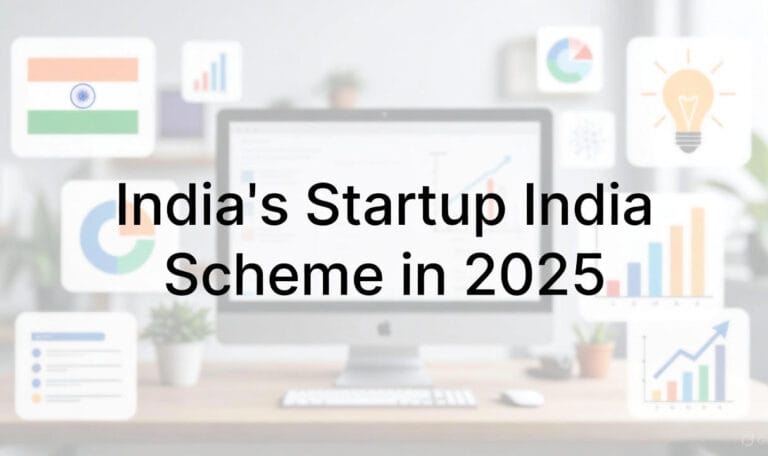The Nine-Digit Key That Can Make or Break Your U.S. Expansion When London-based fintech Wise expanded into the U.S., one of its first hurdles wasn’t customers but securing an IRS Employer Identification Number (EIN) to open bank accounts and hire staff. Now, imagine you land a $500,000 U.S. client deal—you incorporate an LLC, but the bank halts you with, “You need an EIN.” This isn’t uncommon; in 2024, U.S. monthly business applications averaged 430,000, nearly 50% higher than 2019. Without that nine-digit key, your U.S. operations can stall while competitors’ race ahead. Why Foreign Companies Need a U.S. EIN A tax key to unlock U.S. business operations An Employer Identification Number (EIN)—also called a Federal Tax Identification Number—is the mechanism by which the Internal Revenue Service (IRS) tracks business tax filings, compliance, and withholding obligations. It functions like a Social Security Number for corporations, enabling a foreign company to satisfy U.S. legal, banking, payroll, licensing, and taxation requirements. Even foreign entities must secure one if engaging in U.S. business operations. Failing to have an EIN creates major friction, as it prevents you from legally hiring U.S. employees and reporting payroll withholdings, restricts your ability to open a U.S. bank account since most financial institutions require an EIN, and may block access to U.S. vendor networks, marketplaces, or funding opportunities. Additionally, without an EIN you risk delays or penalties in filing essential IRS forms such as Form 1120, Form 941, and other required tax filings. Trends & data that reflect urgency The U.S. is in the throes of a business boom. In 2023, approximately 5.5 million new businesses launched—breaking all prior records. Moreover, projected business formations in August 2025 stood at 28,725 and rose 0.8% compared to July. In a crowded and accelerating landscape, any administrative delay—like not having an EIN—can mean losing clients, talent, or market positioning. In the broader small business ecosystem, the U.S. is home to ~36 million small enterprises, accounting for nearly half of private sector job creation. Between March 2023 and March 2024, 1.1 million new firms opened, adding 1.2 million jobs. That means competition for opportunity and capital is intense. A foreign entrepreneur armed with an EIN can move faster, onboard seamlessly, and integrate into the U.S. economy with fewer obstacles. Missing administrative accessMany non-U.S. founders mistakenly believe they can postpone getting an EIN, but the reality is different—without it, you’ll quickly run into roadblocks the moment you try to open a U.S. bank account, set up payroll, or apply for essential licenses. Securing your EIN early eliminates these hurdles and keeps your operations running smoothly, so it’s wise to begin the EIN process as soon as you incorporate your U.S. entity, whether an LLC or a corporation, rather than waiting for your first client or contract. This proactive approach ensures your business can operate without unnecessary delays and positions you to take advantage of opportunities from day one. Navigating the EIN Application Landscape Methods foreign entities can use While U.S.-based entities can obtain an EIN immediately online using the IRS’s EIN Assistant, foreign entities cannot use this portal and must instead apply through alternative methods. When completing Form SS-4, foreign applicants must note: Expert insight & case study A cross-border SaaS founder in India used a U.S. registered agent to fax their SS-4, and the IRS issued an EIN in 3 days. With their EIN in hand, they opened a U.S. bank account, launched on Stripe, and leveraged U.S. payment rails within two weeks—far faster than most. Accountants and international formation services recommend preparing supporting documentation (e.g. certificate of incorporation, proof of address, board resolution) ahead of time. Confusing IRS instructionsMany foreign entrepreneurs freeze at Box 7 or Box 9’s NAICS classification. Outsourcing prep to a tax advisor or formation service often avoids rejections or delays. Methodology framework: From EIN to Execution — What You Do Next (200-250 words) Post-EIN operational steps Once you receive your EIN (it never expires, unless business structure changes), you unlock several capabilities: A practical challenge is coordinating state-level registrations. Even with your EIN, states may require qualification (e.g. foreign LLC registration, registered agent, state withholding account). Also, aligning your EIN to your U.S. FEIN, filings, and global tax obligations is not trivial. Looking ahead, emerging regulatory pressures include the Corporate Transparency Act (CTA). Though earlier enforcement was enjoined, as of January 2025, Treasury resumed enforcement focusing on foreign reporting companies—those formed outside the U.S. and doing business within. Ensure you maintain beneficial ownership data and compliance readiness. Moreover, new proposals such as Section 899 of the One Big Beautiful Bill Act (if enacted) could target foreign-parented companies with additional tax burdens. As foreign investors assess U.S. exposure, having clean EIN and compliance posture becomes a competitive shield. Complying across levelsMany foreign businesses assume EIN alone solves compliance. In reality, EIN is just the key; you must integrate it into federal, state, payroll, and local systems. From Paperwork to Power: A Practical EIN Application Toolkit Here’s a compact, actionable toolkit you can implement right away. Start by preparing your entity documents, such as the Certificate of Incorporation, company address, and business purpose. Next, complete Form SS-4 using the foreign applicant version—enter “Foreign” in the SSN/ITIN field and designate the responsible party correctly. Once ready, choose your application route: phone, fax, or mail. If faxing, include a return fax number to speed up processing. After submission, track your application and verify EIN issuance by reviewing the official IRS confirmation letter (CP 575). Finally, apply your EIN across all essential areas—banking, payroll, licensing, and state registrations—to fully activate your U.S. business operations. Turning Nine Digits into Global OpportunitySecuring an EIN may feel like a small administrative step, but for foreign entrepreneurs, it’s the nine-digit gateway to unlocking the U.S. market. With it, you gain access to banking, payroll, licensing, and compliance systems that allow your business to compete on equal footing with domestic players. In today’s fast-moving landscape, the companies that prepare early are the ones that scale faster and..
